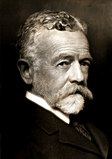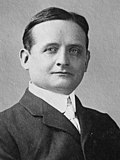The 1916 United States Senate election in Massachusetts was held on November 7, 1916. Republican incumbent Henry Cabot Lodge defeated Democratic Mayor of Boston John F. Fitzgerald to win election to a fifth term.
| |||||||||||||||||
| |||||||||||||||||
 County results Lodge: 50–60% 60–70% Fitzgerald: 50–60% | |||||||||||||||||
| |||||||||||||||||
This was the first United States Senate election in Massachusetts decided by popular vote, as required by the Seventeenth Amendment to the United States Constitution.
Republican primary
editCandidates
edit- Henry Cabot Lodge, incumbent Senator since 1893
Results
edit| Party | Candidate | Votes | % | |
|---|---|---|---|---|
| Republican | Henry Cabot Lodge (incumbent) | 104,118 | 100.00% | |
| Write-in | 2 | 0.00% | ||
| Total votes | 104,120 | 100.00% | ||
Democratic primary
editCandidates
edit- John F. Fitzgerald, former Mayor of Boston and U.S. Representative (grandfather of future President John F. Kennedy)
Background
editIn 1914 Mayor of Boston John F. Fitzgerald was strongly popular in the city, leading him to consider a challenge against the powerful Senator Lodge.[2] When he wavered on whether to run for another term in office, however, James Michael Curley entered the race and usurped him in the January 1914 election. Fitzgerald briefly ran for re-election to another term in office, before withdrawing in December 1913. Though he cited illness, he was in fact being blackmailed by Curley and attorney Daniel H. Coakley, who had learned of his indiscretions with a cigarette girl, Elizabeth "Toodles" Ryan.[3]
Campaign
editThe Democratic state convention was held in Springfield on October 7.[4] Fitzgerald addressed the convention, praising President Wilson and criticizing Lodge, his Senate colleague John W. Weeks, and former President Theodore Roosevelt for opposing the President's re-election during war-time.[5]
Results
edit| Party | Candidate | Votes | % | |
|---|---|---|---|---|
| Democratic | John F. Fitzgerald | 64,551 | 100.00% | |
| Write-in | 2 | 0.00% | ||
| Total votes | 64,553 | 100.00% | ||
General election
editCandidates
edit- John F. Fitzgerald, former Mayor of Boston and U.S. Representative (Democratic)
- Henry Cabot Lodge, incumbent U.S. Senator since 1893 (Republican)
- William N. McDonald (Socialist)
Campaign
editThe first shot of the general election came in September, before the primary elections. At a Lodge campaign rally in Beverly, the Senator made no mention of Fitzgerald, but campaign backer Arthur Black criticized the former mayor's candidacy as a vanity run. Lodge focused his campaign on criticism of President Wilson and support for Republican nominee Charles Evans Hughes.[7]
Fitzgerald attacked Lodge for his opposition to the direct election of Senators and the Federal Employees' Compensation Act. He declared that "[Lodge's] career shows a singular lack of touch with the people... it is for private interests that he has stood during his career."[8]
Lodge also faced criticism over his charge of weakness against President Wilson's response to the sinking of the RMS Lusitania. Lodge was forced to withdraw his charge.[8]
Results
edit| Party | Candidate | Votes | % | |
|---|---|---|---|---|
| Republican | Henry Cabot Lodge (incumbent) | 267,177 | 51.68% | |
| Democratic | John F. Fitzgerald | 234,238 | 45.31% | |
| Socialist | William N. McDonald | 15,558 | 3.01% | |
| Write-in | All others | 26 | 0.00% | |
| Total votes | 516,999 | 100.00% | ||
Aftermath
editIn 1952, Fitzgerald's grandson John F. Kennedy defeated Lodge's grandson Henry Cabot Lodge Jr. to win election to this same Senate seat. Fitzgerald's daughter Rose Fitzgerald Kennedy would say that her son John had "evened the score" with the Lodges and avenged her father's defeat. A final contest between the two families came in 1962, when Ted Kennedy defeated George C. Lodge for the same seat.[10]
References
edit- ^ Office of the Secretary of Commonwealth of Massachusetts (1916). Number of assessed polls, registered voters and persons who voted in each voting precinct in the Commonwealth of Massachusetts at the state, city and town elections. pp. 125.
- ^ Kearns Goodwin 1987, p. 243.
- ^ Kearns Goodwin 1987, pp. 243–47.
- ^ "DEMOCRATS TO MEET OCTOBER 7". The Boston Globe. August 13, 1916. p. 9. Retrieved October 11, 2022.
- ^ "WILSON'S FAME ETERNAL, MR. FITZGERALD SAYS". The Boston Globe. October 7, 1916. p. 14. Retrieved October 11, 2022.
- ^ Office of the Secretary of Commonwealth of Massachusetts (1916). Number of assessed polls, registered voters and persons who voted in each voting precinct in the Commonwealth of Massachusetts at the state, city and town elections. pp. 252.
- ^ "CALLS FOR DEFEAT OF FITZGERALD". The Boston Post. September 24, 1916. p. 3. Retrieved October 11, 2022.
- ^ a b Whalen 2000, p. 5.
- ^ Office of the Secretary of Commonwealth of Massachusetts (1916). Number of assessed polls, registered voters and persons who voted in each voting precinct in the Commonwealth of Massachusetts at the state, city and town elections. p. 558.
- ^ Whalen 2000, p. 6.
Bibliography
edit- Whalen, Thomas J. (2000). Kennedy versus Lodge: The 1952 Massachusetts Senate race. Boston, Mass.: Northeastern University Press.
- Kearns Goodwin, Doris (1987). The Fitzgeralds and the Kennedys.

